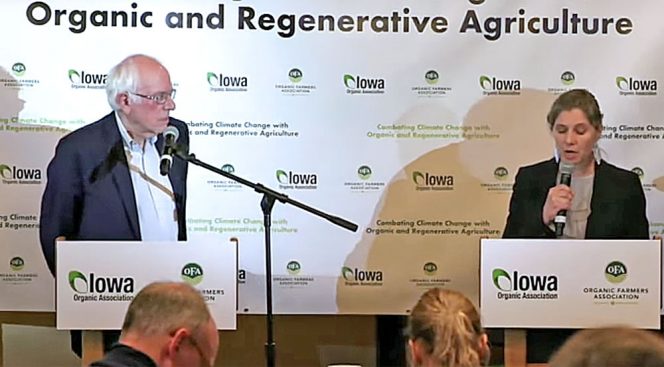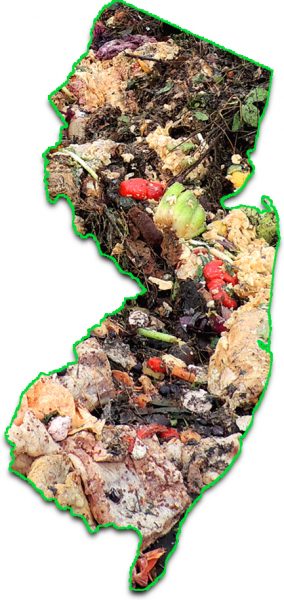Presidential Candidates Weigh In On Soil Health

Bernie Sanders at the “Combating Climate Change with Organic and Regenerative Agriculture,” forum, held in Story City, Iowa on December 5, 2019.
The Organic Farmers Association (OFA), a national policy organization committed to providing a strong and unified voice for certified organic farmers, and the Iowa Organic Association, hosted a “Presidential Forum on Combating Climate Change with Organic and Regenerative Agriculture” in Story City, Iowa, in December. The forum was attended by Sen. Bernie Sanders, who spoke to a crowd of 50 organic farmers and fielded questions. Sen. Elizabeth Warren and Mayor Pete Buttigieg, who did not attend the forum, responded to the questions in writing.
Sanders emphasized the role regenerative organic agriculture will play in mitigating climate change. “If the agricultural community can be aggressive in maintaining good soil that will absorb carbon, that will be an enormous contribution to fighting climate change,” he stated. “We should be prepared to provide assistance for that.”
Both Warren and Buttigieg identified the need for the government to provide incentives to farmers to introduce regenerative practices that can help combat global issues like climate change. “As president,” said Warren’s response, “I will lead a full-out effort to decarbonize the agricultural sector and rebuild our soil and water by paying farmers for using sustainable farming practices, expanding research and development in regenerative techniques, and building demand for locally-grown, sustainable farm products.”
Noted Buttigieg: “My administration will also improve soil health and promote policies to keep our environment safe and healthy. I will provide opportunities for farmers to get paid for sequestering carbon in their soil, including through reduced and no tillage of soil, cover crops, precision nitrogen management, improved grazing systems, and science-based crop rotation plans.” Responses are posted in full on OrganicFarmersAssociation.org.
Food Waste Reduction For Greener Schools
Bigger, brighter signs and an emphasis on sharing leftover food enabled the Central Vermont Solid Waste Management District, headquartered in Montpelier, to succeed in reducing the amount of food thrown out each week in eight schools in five towns in the District. The Food Waste Reduction for Green Schools project, which won a 2018 EPA Healthy Communities Grant, accomplished four specific aims: Reduce the amount of wasted edible food; Increase food donation and install “share tables” (uneaten and/or unopened foods after the meal are put on a table for others to take with them); Make sure remaining scraps are diverted from landfills; and Spur the broader community to reduce food waste. The project also tried to uncover obstacles that keep schools from composting or sending wasted food to farms.
Past food audits in central Vermont schools showed that food scraps made up as much as half the weight of trash. The areas targeted in this project have significant portions of students who qualify for free or reduced lunches and may have limited access to food outside of school. As a result of this project, 7 of the 8 schools reduced wasted edible food and milk over the year; overall food waste was cut by 17.4 percent and milk waste by 41 percent. Share tables were upgraded in five schools, increasing the amount of unopened food shared by students. Of the six schools measured, five reduced the portion of their trash that was food waste. Audits showed unopened milk cartons in the trash, indicating the share table could be strengthened to divert milk. Although all the schools have food waste collection buckets in cafeterias, some food ends up being thrown away.
District staff now have baseline data to measure the impact of new initiatives. Project leaders plan to create a School Food Waste Reduction Guide to inform programs how to reduce food waste in other schools in the district. Contact Central Vermont Solid Waste Management District (cvswmd.org) for more information.
 No Final Vote On New Jersey’s Food Waste Legislation
No Final Vote On New Jersey’s Food Waste Legislation
The lame duck session of the New Jersey Legislature ended on January 14 without passage of revised food waste recycling legislation — originally passed in June 2019 and vetoed by Gov. Phil Murphy because it contained broad exemptions from the recycling requirement for food waste sent to an incinerator under certain conditions or to a landfill with a landfill gas capture system. The legislation (A3726) was reintroduced in the lame duck session without those exemptions, and Gov. Murphy supported it. The bill required recycling of food waste by “large food waste generators” (i.e., certain commercial and institutional entities that produce at least 52 tons/year of preconsumer food waste). A3726 passed the Assembly, and was expected to pass the Senate before the session ended on January 14. There’s hope that the sponsor of the bill will reintroduce it in the next session.










